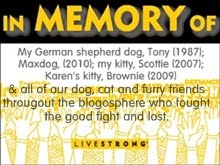Dr. David Dosa poses with Oscar, the cat who senses when patients are going to die at the Steere House Nursing Home in Providence. Dosa has written a book about his experiences with the unusual feline.
By Linda Murphy
GateHouse News Service
Mon Feb 08, 2010, 01:18 PM EST
In 2007, Dr. David Dosa wrote an essay for The New England Journal of Medicine about a cat at the Steere House nursing home in Providence who apparently had the ability to sense when a patient was going to die. The media picked up the story and almost overnight, Oscar the cat became an international phenomenon.
“We attributed the unexpected publicity to one part cat, one part death and a slow news day,” Dosa said.
The international interest in the cat led to Dosa’s book, “Making Rounds with Oscar: The Extraordinary Gift of an Ordinary Cat,” which was released last week.
Barrington, R.I., resident Dosa, a staff geriatrician at the Steere House and assistant professor of medicine at the Warren Alpert Medical School of Brown University, said to date the cat has sat vigil with 50 patients at the nursing home.
“When I wrote the essay I was worried that there would be a mass exodus from the nursing home when the patients’ families read it, but it’s been just the reverse. Families are wonderfully accepting of Oscar,” Dosa said.
Though there’s no clear explanation for Oscar’s uncanny ability to sense when a patient is going to die, Dosa said it’s possible the cat may be attuned to the sweet-scented ketones or other cellular byproducts that are released from dying cells. He also said animal behavior experts have suggested the cat may be attuned to the urgency of the nursing home staff when a patient is close to death.
A scientist with a self-proclaimed aversion to cats, Dosa at first doubted Steere House nurse Mary Miranda when she tried to convince him of the cat’s unusual behavior.
Oscar, one of several cats at the nursing home, wasn’t known to be particularly friendly or to spend any time with patients. But when one of the elderly nursing home residents was about to die, the cat would be found stretched out purring on the bed, providing comfort in the patient’s last hours.
“I was very skeptical,” he said. “It brings you down a peg when a cat knows more than you. But as two vigils turned into four vigils, it eventually began to whittle its way into our psyches.”
If there’s one clear-cut case when Dosa said he began to believe Oscar had the ability to sense when a patient at the Steere House was going to die, it was the day the cat sat with a patient while the nursing home staff was gathered in the room of another patient that they expected to die.
They sent a nurse’s aide to find the cat, thinking Oscar’s streak of predicting death was broken. But every time the aide tried to bring the cat to the patient’s room at the opposite end of the floor, he returned to the room where they found him.
Oscar’s patient died first while the patient they expected to die remained alive until the following day, when the cat sat vigil in that room.
“It was clear that Oscar knew more than us that day,” said Dosa.
While Oscar is clearly central to the story, the book also sheds light on the touching end-of-life stories of the patients, many of whom have dementia, and their families as they wrestle with losing their parent or spouse.
“I interviewed families for the book and in talking to them I found they all had different feelings about what Oscar was doing, but they all took comfort in the fact that he was there for them,” he said.
Dosa, one of only 7,000 geriatricians in the country, also uses the broadly fascinating story of the cat to call attention to the less-attention grabbing issues of dementia, end-of-life care, a need for health care reform and the ramifications of the upcoming “silver tsunami” of the country’s aging population.
In one of the earlier stories in the book, Dosa and the husband of a woman dying of Alzheimer’s disease are at odds over submitting the clearly diminishing woman to a barrage of potentially painful tests to determine if the woman has colon cancer.
“I know you love your wife,” he tells the husband, who has just ordered the doctor to do everything possible for the woman. Dosa, realizing the tests and potential subsequent cancer treatment of the dying woman would be pointless, adds: “Sometimes the deepest act of love is letting go.”
“Patient choice at the end of life is so important. At the end of the day I’d pick a cat over the ICU (Intensive Care Unit),” said Dosa. “One of the messages I hope people take away from the book is the need to discuss those decisions. We all have different goals and values.” The Herald News of Fall River, Mass.








.jpg)












































.jpg)













.jpg)


.jpg)






.jpg)









.jpg)
9 comments:
What a sweet/sad story! Oscar certainly is a special cat.
Cats are very smart and comforting in a time of need ...
Oscar is really special and is fulfilling his life mission gracefully!
FAbulous cat and so interesting story, thanks for sharing!
purrs and love
Luna
Jan just finished reading the story in the Reader's Digest last night. She remembered the story of Oscar the cat and really enjoyed the Dr.'s story. He wasn't a cat person. Wonder if he is now? :-)
Great story about an amazing cat! Fanks for sharing!
Love your comment at the top!
What a fascinating story! Oscar is special, but hey, so are your cats (and mine!) I like your blog - very creative.
Sunshine and blessings...Beth
We have heard of Oscar but your reporting is special. Thankyou for sharing.
Post a Comment